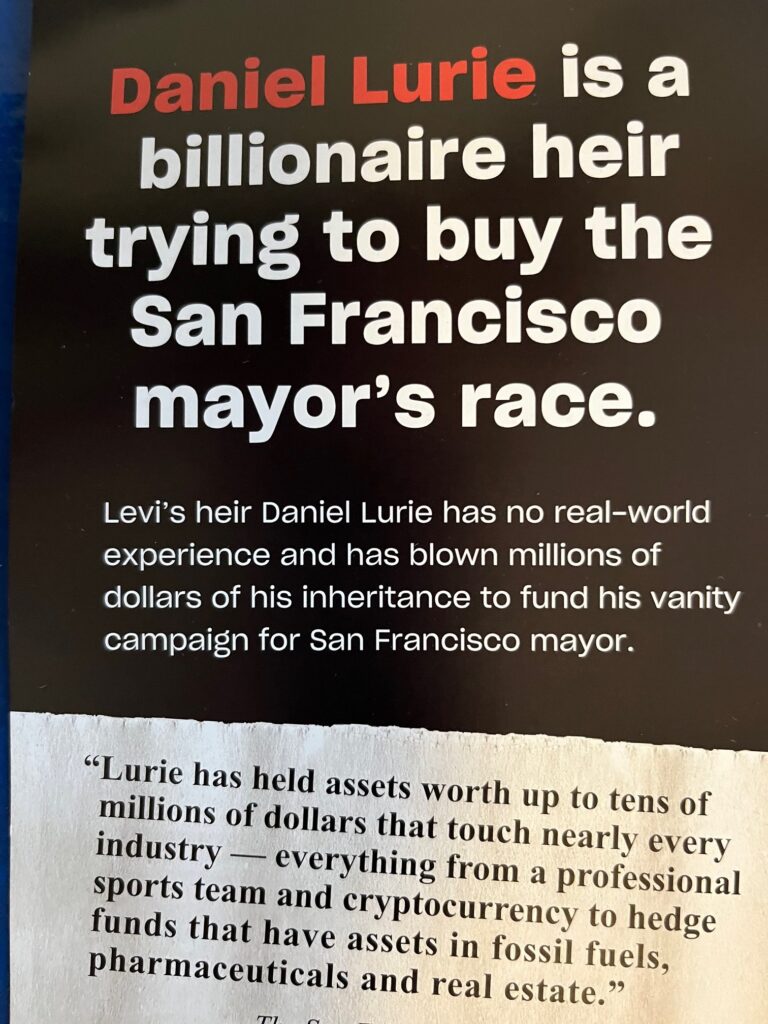The mayor’s race is becoming a sprint to the finish, with ballots getting mailed out to voters this week—and it’s getting predictable nasty … and weird.
That’s not a surprise when the polls show the race is really close. Daniel Lurie’s campaign released a poll today showing Lurie winning in ranked-choice voting. A poll by Growsf shows Breed beating Lurie—but also shows that Mark Farrell, Lurie, and Sup. Aaron Peskin are essentially tied after the first round, which means any of them could emerge as the second-place candidate and win with Ranked-Choice Voting.
So the gloves are off.
Farrell clearly sees Lurie as his biggest threat. That’s why I got this door hanger:

Which is particularly interesting since the biggest donor to Farrell’s campaign (actually, an independent expenditure campaign supporting Farrell) is billionaire (and noted GOP donor) William Oberndorf. Farrell is, in other words, supported by billionaires who are trying to buy the election.
So is Breed—but Farrell isn’t attacking her over her campaign donors.
Meanwhile, Farrell and Sup. Ahsha Safai have made an alliance, of sorts. They’ve agreed to endorse each other as second choices—a move that won’t help Safai, who is so far behind in the polls that he will almost certainly be the first major candidate eliminated, but might help Farrell.
Right now, according to the Growsf poll, 51 percent of Safai’s second-place votes go to Peskin, 16 percent to Breed, and 18 percent to Lurie. None of them go to Farrell.
It’s a big lift to change that, particularly since Safai’s voters are more likely to be working class and union folks, and Farrell is a rich white guy and the candidate labor unions most distrust.
But clearly Safai thinks there’s a chance Farrell can win, and if you are out of work in January and looking for a nice city job, having a close alliance with the new mayor would not be a bad thing.
The Yimby folks are, of course, attacking Peskin, and the Chron is giving them a forum.
My first thought is to be shocked, shocked that something political is happening at City Hall. Tenants are a key constituency in the election, and it’s not surprising that the most pro-tenant candidate would be looking for an issue that forces the others, particularly the mayor, to take a stand on rent control.
It’s worked, too: Breed has made clear that she does not support repealing the Costa-Hawkins Act, which limits local rent control options, which gives Peskin a valid argument against her.
But set the politics aside for a moment: The piece by two Yimby leaders takes the exact same line that big landlords have been peddling for decades, every time anyone suggests expanding rent control:
Oh, no, we can’t do that! It might discourage new housing!
Developers would be incentivized to build for-sale condos instead of rental housing, or more likely, they simply won’t build in a city where they know they can’t cover their costs or make a reasonable return on investment. Housing construction — which has already significantly slowed due to high costs and inflation — will grind to a halt. This will push prices higher as the demand for housing continues to significantly outpace the supply.
Let’s parse that for a moment. Developers are the ultimate capitalists, and so are the lenders who finance their projects. Every single rental housing project that is proposed or built in San Francisco starts off with market-rate housing. Rent control doesn’t do anything to address the initial rent that a landlord charges.
When developers go to get financing, they give the lenders a pro forma that shows what rent they are going to charge—on opening day, not five years from then. Nobody knows what market-rate rent will be in the future. So the profit is based on Day One, not on whether the rent is limited in the future.
Besides, Peskin’s bill specifically stops at Nov. 5, 2024; anything built after that would be exempt from rent control anyway.
And an honest discussion about rent control starts with the idea that the opponents have been wrong for half a century:
As recent empirical work has shown, the neoclassical account’s core assumptions—one, that rent control restricts the supply of new housing; and two, that it misallocates existing housing, thereby causing an irrecoverable collective loss—fail to hold when it comes to the real world.
And a growing number of economists are arguing that rent control is a positive policy.
So this is nonsense.
The Yimbys also argue suggest that rent control could be imposed after 30 years, when the original financing has been paid off. Again, as Sup. Dean Preston, who has worked for decades on tenant legislation, pointed out at the hearing on this bill, the landlord lobbyists constantly suggest this as an alternative to rent control—and then after they’ve defeated the latest tenant bill, they disappear and so does this idea.
Oh, of course the Yimbys cite studied by the Tener Center at US Berkeley. They don’t say that institution is funded in part by the same folks who argue for more market-rate housing and no rent control.
Take a look at the record. San Francisco is the only one of the nine Bay Area counties that has expanded its market-rate housing stock every decade since the 1960s. And most of that has happened under rent control.
What’s really going on here is the Chron’s ongoing efforts to make sure Peskin isn’t mayor—and the Yimbys finally admitting that they are on the side of the big landlords on the most essential tenant issues.
Full disclosure: Both of my kids work on the Peskin for Mayor campaign.





